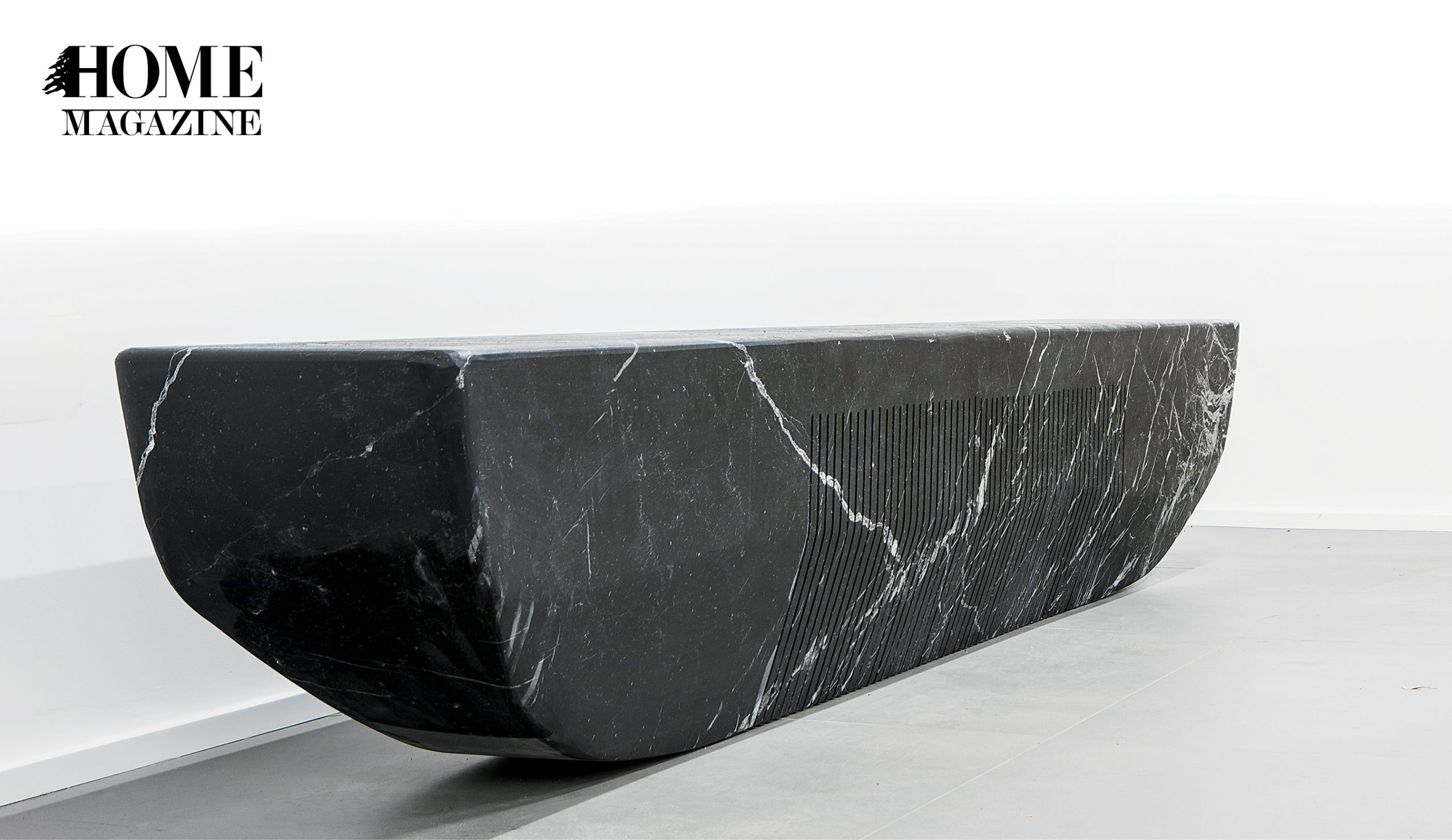In the last decade, the traditional world of Lebanese design has been invigorated by a wave of modern, young creatives. They are satisfying a growing appetite for objects and furniture that are contemporary and avant-garde; not imported from Italy or Scandinavia but conceived and produced right here in Lebanon.
Thirty-year-old Thomas Trad is a leading voice in this exciting scene. Trained at Central Saint Martins (CSM) in London, he has worked with the distinguished studios Fredrikson Stallard and Michael Anastassiades. Since his return to Beirut in 2016, from his studio in Achrafieh, he has been creating sleek, experimental, and playful designs that push the boundaries of the unexpected.
Trad’s first exposure to this field came early in life. He spent much of his childhood in his father’s shop, Les Arcades in Furn al-Hayek, which sold (and still sells) contemporary glassware, ceramics, silverware, and decorative objects.
Twice a year, his father would catch a flight to Paris or Frankfurt to select pieces from the latest collections. With each update, Trad watched the evolution of modern design, and his understanding deepened. “My father used to love talking about it, and showing me the new pieces he brought back,” he says. “So I became fascinated by new designs, new objects.”
This exposure has given Trad a keen eye for what is ahead of the curve and stands out from the rest. As a child, he was struck especially by Arne Jacobsen’s Cylinda-line collection (Stelton, 1967) for its startling simplicity and atmosphere of modernity. Now, as a designer, he is driven by a desire to offer something genuinely different from everything else on the market.
 Photo by Charbel Saade
Photo by Charbel Saade
Moving away from the idea that every work should start from a story — a creative process that Central Saint Martins teaches its students — Trad has begun to take greater inspiration from the materials that he utilizes, and the manufacturing processes themselves. One example is Kujira L, his recent bench in black marble. This monolithic piece blends extremes of unyielding flatness and smooth roundness. It is at once solid yet porous, massive yet slight.
“The idea came originally because I wanted to use one particular machine, a massive saw with 40 to 50 blades,” says Trad. “They use it to cut slabs of marble for tiles or tabletops, but I was interested in the texture it would give to the rock. The final product is more like a sculpture than a practical object. It weighs 600 kg. It’s hell to transport!”
In the center of the studio stands Uroko, a large, white, marble table. This is where Trad meets clients and sketches out his new ideas. Here too, his playful attitude to form and texture can be seen, and his love of materials and processes shows in his finished pieces.

Instead of four legs, two broad, oaken cylinders support the tabletop. The top of each cylinder, a wooden disc, projects just above the marble. The smooth surface frames the roughness of the oak’s intricate carving, which is something between honeycomb and the scales of an animal.
The woodwork is one example of Trad’s eagerness to draw upon Lebanon’s rich tradition of skilled craftsmanship. His greatest inspiration comes not when he is sitting behind a desk, but when he is working with his hands in the factory.
At times, this process can be a little frustrating. “Craftsmen in London are very used to designers,” Trad comments. “But here, they are used to very traditional, intricate work with gold details, roses, and so on. When I ask them to do something very simple, they don’t really understand why. It can be an interesting exchange, and sometimes the two meet in a very nice way, such as in my Eva partition.”
One result of this fascination for the manufacturing process has been the desire to learn the craft with his own hands. Having read a great number of books about carpentry, he finally had the opportunity in March to travel to Kyoto for an intensive one-month course in traditional Japanese woodwork.
 Photo by Charbel Saade
Photo by Charbel Saade
Even more than the practical training, it was the philosophy that underlies it that left a great mark on Trad. “For them the materials are still living. Before working, you always have to read the wood: the way the grain goes, if there are any knots, if the tree was growing this way or that way,“ he says.” The way they talk is amazing. The way they see things is just beautiful.”
Trad brought back stacks of tools on his return and is converting his studio into a workshop. Carpentry has become his main hobby — one where he can disconnect from his everyday routine and focus on the material itself. It is like a meditation. He can clear his head and allow ideas to surface.
It is from this active engagement with the material and the process that he draws his greatest inspiration. “I don’t want to just use a pen,” the designer concludes. “I hate it.”
For more info:
https://www.instagram.com/thomastrad/
https://www.facebook.com/thomastradstudio/


































 by
by